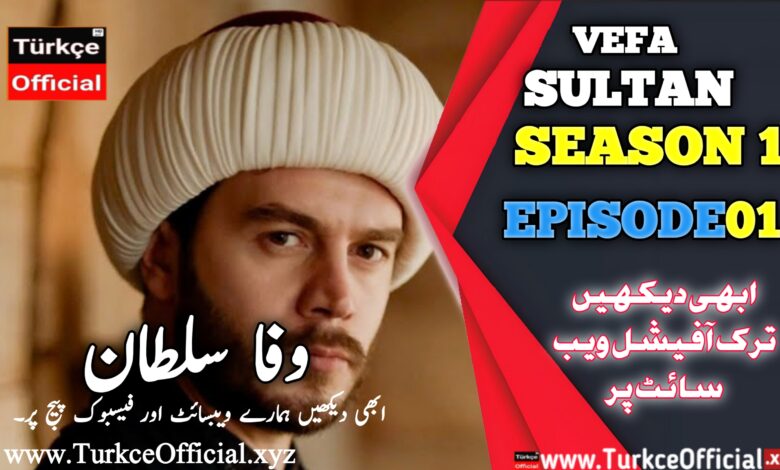
Vefa Sultan is a historical Turkish drama series. Here are some of the main topics explored in the series: 1. Ottoman Empire: The series is set in the Ottoman Empire during the 16th century and explores its politics, culture, and history. 2. Suleiman the Magnificent: The series focuses on the life of Suleiman the Magnificent, one of the most famous Ottoman sultans. 3. Hurrem Sultan: The series also explores the life of Hurrem Sultan, Suleiman’s wife and a powerful figure in Ottoman history. 4. Palace Politics: The series delves into the intrigue and politics of the Ottoman palace, including the struggles for power and the relationships between the sultan, his wives, and his advisors. 5. Love and Romance: The series explores the romantic relationships between the characters, including Suleiman and Hurrem’s famous love story. 6. War and Conquest: The series depicts the Ottoman Empire’s military campaigns and conquests during Suleiman’s reign. 7. Islamic History and Culture: The series touches on Islamic history and culture, including the role of Islam in Ottoman society and the relationships between Muslims and non-Muslims. These are just some of the main topics explored in Vefa Sultan. The series is known for its historical accuracy and its engaging portrayal of Ottoman history and culture.\

Vefa Sultan is a Turkish historical biography television mini-series that premiered on March 1, 2025, focusing on the life of Muslihuddin Mustafa, affectionately known as “Vefa Sultan,” who is regarded as the spiritual sultan of Istanbul.
The series primarily explores Vefa Sultan’s pursuit of knowledge and wisdom, highlighting his significant contributions to Istanbul’s spiritual heritage. While the series is set during the 15th century—a period marked by significant events such as the Fall of Constantinople in 1453 under Sultan Mehmed II—the narrative centers on Vefa Sultan’s spiritual journey rather than the empire’s military campaigns. Therefore, themes of war and conquest are not the main focus of this series.
For viewers interested in Ottoman military history and conquests, other series like Rise of Empires: Ottoman delve into such themes, portraying events like the Fall of Constantinople and the expansion of the Ottoman Empire under Sultan Mehmed II.
It looks like there’s some confusion—these topics align more with Muhteşem Yüzyıl (Magnificent Century), the famous series about Suleiman the Magnificent. Vefa Sultan, on the other hand, is a new historical drama focused on Muslihuddin Mustafa, also known as “Vefa Sultan,” a spiritual figure in Ottoman Istanbul.
Vefa Sultan explores themes such as:
- Spirituality and Sufism – The life and teachings of Vefa Sultan as a religious and spiritual leader.
- Ottoman Istanbul – The cultural and social structure of 15th-16th century Istanbul.
- Wisdom and Knowledge – Vefa Sultan’s journey in seeking and spreading wisdom.
- Moral and Ethical Challenges – The struggles faced in upholding spiritual and moral values in a changing world.
Vefa Sultan explores Islamic history and culture through the life and teachings of Muslihuddin Mustafa, also known as Vefa Sultan, a significant spiritual figure in Ottoman Istanbul. Here are some key aspects of how the series reflects Islamic history and culture:
1. Sufism and Spirituality
- Vefa Sultan was a prominent Sufi scholar, and the series highlights his role in the spread of Islamic mysticism (Tasawwuf).
- It delves into the importance of zikr (remembrance of Allah) and spiritual teachings in Ottoman society.
2. Ottoman Religious Institutions
- The series showcases madrasahs (Islamic schools) and their role in education.
- It also highlights the role of dervish lodges (tekkes) as centers of spiritual and communal life.
3. The Role of Scholars and Saints
- Vefa Sultan was respected not only as a scholar but also as a wali (saint) in Islamic tradition.
- His influence in shaping religious thought and guiding people through Islamic teachings is a central theme.
4. Relationship Between Islam and Governance
- The series likely explores how Islamic law (Sharia) and ethics influenced Ottoman rulers and policies.
- The connection between Sufi scholars and the Ottoman elite is an important historical aspect.
5. Interfaith Relations and Tolerance
- The Ottoman Empire was home to Muslims, Christians, and Jews, and the show may touch on how religious coexistence was managed.
- The Islamic concept of justice and mercy in governance is often a key element in historical dramas.
Vefa Sultan is set in the Ottoman Empire, particularly during the 15th century, and explores various aspects of Ottoman history, society, and governance. Here’s how the series connects to the Ottoman Empire:

1. The Rise of the Ottoman Empire
- The series is set during the time of Sultan Mehmed II (Mehmed the Conqueror) and possibly his successors.
- This was a crucial period when the Ottomans expanded their empire and solidified their rule over Istanbul (formerly Constantinople).
2. The Role of Scholars and Sufi Figures
- Vefa Sultan focuses on Muslihuddin Mustafa, a significant Sufi scholar and Islamic thinker.
- He played an important role in shaping Ottoman spiritual life, guiding people with his teachings.
3. Ottoman Society and Culture
- The show highlights Islamic traditions, Sufism, and religious education, which were key elements of the Ottoman Empire.
- It may explore daily life in Istanbul, including the interactions between scholars, rulers, and the common people.
4. The Ottoman Sultan’s Patronage of Scholars
- The Ottoman rulers valued Islamic scholars and Sufi saints, often seeking their guidance in governance.
- Vefa Sultan’s influence as a spiritual leader might be depicted in how he interacted with Ottoman elites.
5. The Architectural and Educational Legacy
- The Vefa district in Istanbul is named after him, reflecting his lasting impact on the city.
- The construction of madrasahs (Islamic schools) and mosques during this period is an important aspect of Ottoman culture.
PLAYER; 1
Vefa Sultan 1 Bölüm @Trt1-1While Vefa Sultan primarily focuses on spirituality and scholarship, Palace Politics in the Ottoman Empire may still play a role in the series, as scholars and religious figures often had connections with the ruling elite. Here’s how palace politics might be explored in Vefa Sultan:
1. The Relationship Between Sufi Scholars and the Palace
- The Ottoman sultans often sought guidance from Islamic scholars and Sufi leaders.
- Vefa Sultan, as a spiritual figure, may be shown interacting with the Ottoman court or advising rulers on religious and ethical matters.
2. The Role of Sultan Mehmed II (Mehmed the Conqueror)
- Since the show is set in the 15th century, it may feature Mehmed II, who valued scholars and established Istanbul as an intellectual and cultural center.
- The balance between religious wisdom and political authority could be a key theme.
3. Power Struggles and Court Intrigue
- Ottoman palace politics were often filled with rivalries among advisors, viziers, and royal family members.
- While Vefa Sultan may not focus on power struggles like Magnificent Century, it might depict court conflicts involving religious authorities.
4. Influence of Religious Institutions on Governance
- The Ottoman Empire had a strong religious foundation, with scholars playing a role in legal and political matters.
- The series could explore how figures like Vefa Sultan influenced moral decisions within the empire.
5. The Role of the Ulama (Islamic Scholars) in Politics
- The ulama (Islamic scholars) were highly respected and sometimes involved in palace decisions.
- Vefa Sultan, as a religious leader, might navigate challenges posed by political figures who had different interests.
Conclusion on Vefa Sultan
Vefa Sultan is a historical Turkish drama that brings to life the spiritual and intellectual legacy of Muslihuddin Mustafa (Vefa Sultan) during the Ottoman Empire. Unlike many Ottoman-era dramas that focus on war and political intrigue, this series highlights Sufism, religious scholarship, and the cultural development of Istanbul in the 15th century.
Key Takeaways from the Series:
- A Unique Historical Perspective
- Instead of focusing on sultans and military conquests, Vefa Sultan explores Islamic spirituality and wisdom.
- The show provides insights into Sufi teachings and their impact on Ottoman society.
- Rich Ottoman Cultural and Religious Themes
- The series highlights the role of scholars, madrasahs, and dervish lodges (tekkes) in shaping Ottoman intellectual life.
- It showcases the interplay between religious leaders and the ruling class, reflecting how governance was influenced by faith.
- A Glimpse into Ottoman Society
- Vefa Sultan offers a detailed portrayal of life in Istanbul, emphasizing religious tolerance, scholarship, and community building.
- It explores the values of justice, humility, and devotion as taught by Vefa Sultan.
- Historical and Educational Significance
- The series serves as an educational tool for those interested in Islamic history and Ottoman heritage.
- It presents a balanced narrative that merges historical facts with engaging storytelling.
Final Thoughts:
If you enjoy historical dramas with deep spiritual and cultural themes, Vefa Sultan is a must-watch. It not only narrates the life of an importa
